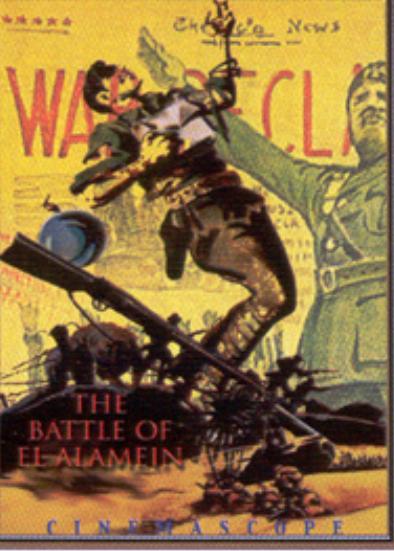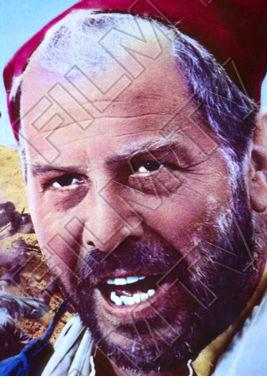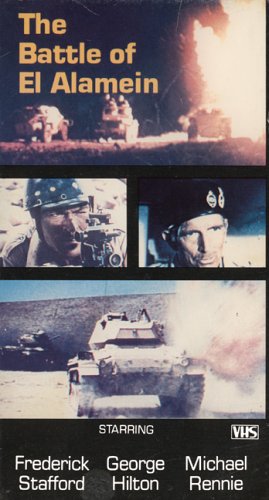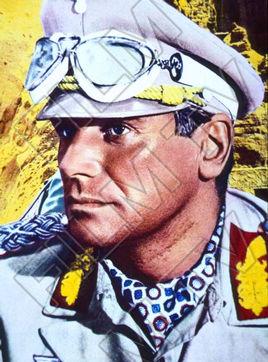|
|
Regia:[Giorgio
Ferroni]Calvin Jackson Paget
Enrico Maria Salerno |
|
|
Alamein il Film intero 1969 |
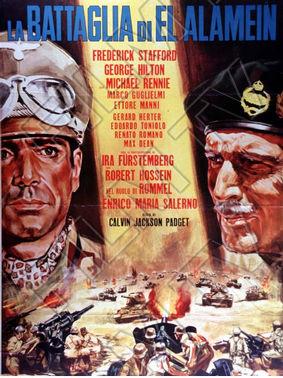 Robert Hossein .... Field Marshal Erwin Rommel Robert Hossein .... Field Marshal Erwin RommelMichael Rennie .... Gen. Bernard Law Montgomery Ira von Fürstenberg .... Marta Enrico Maria Salerno .... Claudio Borri Marco Guglielmi .... German captain Ettore Manni Edoardo Toniolo Renato Romano .... British Officer Luciano Catenacci .... Sgt. O'Hara Sal Borgese .... Kapow Ugo Adinolfi Giuseppe Addobbati .... Gen. Georg Stumme |
|
| http://film.spettacolo.virgilio.it/cinema/ | ||
|
Trama Altri titoli La bataille d'El Alamein (Fr), Königstiger vor El Alamein (WG) 1968 |
It's quite pleasantly unusual to come across a second world war film which looks at events through the eyes of individuals on the losing side. Often dismissed as mere Italianate propaganda, The Battle of El Alemein is in fact a fast moving action picture that comes to the conclusion that virtually every film of it's type seems to come to; that war is pretty damn silly, and the ones who pay are the ones who don't have any say in events in the first place. Africa, 1942, and the Axis alliance between Germany and Italy has held the upper hand in the desert war. This is by no small means due to the military skill of Field Marshall Rommel (Robert Hossein), who is unfortunately suffering from kidney problems and general fatigue. Already knowing that their superiority is on the wane, he is ordered home to rest by Hitler. Meanwhile, the English forces are being rallied by the newly arrived Montgomery (Michael Rennie), and begin to drive back their enemies from the positions which they had gained. Interspersed with these events is the story of Giorgio (Frederick Stafford), a young officer who has come to lead his squadron after the untimely death of his Captain. He is at first unpopular with his men, who understandably resent his apparent disregard for their lives in his quest for medals and glory. Slowly, however, he begins to gain their respect as he learns that he is dealing with real people rather than simple statistics. He is also helped by the prescience of his brother Paolo (Enrico Maria Salerno Bersagleri), an experienced Sergeant Major who seconds himself to their aid. Aside from the variety of humorous plummy accents on display, Battle is an enjoyable, pacey production that obviously had a fairly decent budget and uses it's familiar Almeirian (Almeria Spagna, ma anche litorale romano e cave. Nelle riprese vennero coinvolti i Bersaglieri del BAR (battaglione addestramento reclute) di Forte Tiburtino) locations well. As an example of the short lived war film genre that flourished in the late sixties (other Euro examples being Alberto De martino's Dirty Heroes (Dalle Ardenne all'inferno, 67) and Mino Loy's Desert Battle (La Battaglia del deserto, 1969), it seems to be a slight less gung-ho enterprise than normal. Not to say that you don't get the normal heroics, but there's an underlying fatalism and a political awareness that taints the energetic narrative. Director Giorgio Ferroni was a more than capable craftsman who's CV is choc-a-bloc with interesting titles like Mill of the Stone Women (Il Mulino delle donne di pietra, 1960), one of the few gothic horrors to rightfully compare to the best of Mario Bava, and The Bacchantes (I Baccanti, 1961) , a poetic peplum which is one of my personal favourites. The large cast is literally stuffed with recognisable craggy faces, but the standout performance comes from Enrico Maria Salerno, a hugely underrated actor who died of cancer in 1994. The Battle of El Alamein is a great example of a well-made Italian World War II film. All the elements of an epic are here -- good characters, a star-studded cast, stunning scenery, a well-written script and, of course, big battle scenes. Critica: |
|
|
|
The movie focuses mainly a platoon of Italian front line troops, fighting in North Africa. Their uneasy Allies are the German Afrika Korps. Opposing them are the harsh British forces. The battle drags on and on, and eventually the platoon is left to single-handedly fend of a colossal British tank attack. This movie holds up extremely well in almost every department. The cast is excellent: Frederick Stafford (Eagles over London) is a great leading man as inexperienced Lt. Borri. He goes by the book, trying to become a hero; but, in the end, he gains battle experience and begins to ease up on his men as he sees the horrors of war. His brother, played by Enrico Maria Salerno, is the tough, experienced Sergeant. Their chief opponent is a British Lieutenant (George Hilton from Desert Assault), who befriends Stafford when he's temporarily taken prisoner. The two end up facing each other again in a great climactic scene. Robert Hossein (another Desert Assault star) is excellent (though poorly dubbed) as General Rommel -- just as good as James Mason in The Desert Fox. Michael Rennie (Commando Attack) plays General Montgomery, and his role is written to make the British look like unsympathetic, bloodthirsty villains. He plays the part you'd expect a Nazi to play, and does it quite convincingly. Other notable cast members include Gerard Herter (Adios, Sabata) as a power-hungry German General; Marco Guglielmi (Battle Force) as a German front-line Captain; Tom Felleghy (Kill Rommel!) as an incompetent German General; Sal Borgese (Five for Hell) as a dimwitted Italian grunt; and Nello Pazzafini as a tough Italian platoon sergeant. And watch fast for Ettore Manni (Heroes in Hell) as an Italian captain who gets killed during an artillery attack. Finally, there's Renato Romano (The War Devils) as a British officer who becomes a POW. The battle scenes are, for the most part excellent. There is one night scene involving some awfully obvious miniature German tanks that left me in stitches. Otherwise, the battle scenes are great, well-edited and very believable. Cinematography is superb, brining us plenty of vast desert vistas that look incredible even in pan & scan. The musical score is bleak and very powerful.
Overall, this war film is amazingly well-made. The cast is excellent; the performances nothing less than convincing and the movie has a great epic feel to it. Not to be missed! I purchased this as part of a package deal - you know the type, 4 WW 2 films in one box for under $15. Half of the films in this set were good and this is the best of the lot. It's the story of the British victory at El Alamein as told from the Italian perspective. The acting isn't the film's strong suit, but it's adequate. The story is excellent and the execution of the screenplay is superlative. There are some really good battle sequences as well. Look for a decent performance from Michael Rennie as the British General Bernard Law Montgomery. He isn't a Field Marshal yet. In fact, it was this victory that earned him his Baton. Overall, a fine flick. I don't know how factual it is, although the overall story seems accurate enough. |
|
|
|
Africa 1942. Il generale Montgomery sferra l'attacco decisivo contro Rommel. Gli Italiani tentano di resistere. Realizzato con molti ? mezzi (venne girato sul litorale romano e nelle cave di Santa Severa con reclute tratte dal B.a.r (battaglione addestramento reclute bersaglieri del Tiburtino !!) è un film di guerra con gli stereotipi del western ciociaro. Tutti sono simpatici, tranne gli ufficiali nazisti. Hossein interpreta disinvoltamente Rommel. Il film che vantava un cast d'eccezione, ma mezzi scarsini si fa apprezzare più di tanti altri prodotti anche recenti. Di valido, almeno per la tecnica bellica usata la scena della cattura del Gen. Clifton. Cosi la racconta Renato Migliavacca ne La Folgore nella battaglia di El Alamein pag 8/9). I difensori (IX battaglione e III gruppo artiglieria Folgore) lasciarono entrare (filtrare) gli avversari all’interno delle difese (dei centri di fuoco) e, immobilizzatili nelle maglie dal fuoco incrociato delle armi automatiche, li contrattaccarono con estrema determinazione. Riuscirono in tal modo a cogliere completamente di sorpresa gli attaccanti i quali subirono durissime perdite, anche in armi e prigionieri. Relativamente esigue le perdite dei difensori. La tattica del lasciarsi deliberatamente sommergere era stata messa a punto dal comandante del IX battaglione e dai suoi ufficiali perfezionando quanto era già accaduto durante il combattimento del 3-4 settembre 1942 ricordata come la battaglia di Alam Halfa, ultima chance di Rommel (fu in questa prima occasione che venne fatto prigioniero il gen. brig. George H. Clifton) (Our (inglesi che parlano) casualties during the latest operations were approximately 70 killed, 40 missing, and 250 wounded.1 I am exercised over our losses of senior officers in the last two months: one Brigadier and five commanding officers killed, one Brigadier and three commanding officers captured. Brigadier J. R. Gray and Lieutenant-Colonels E. Te W. Love, S. F. Allen, A. W. Greville, J. N. Peart, and J. T. Russell were killed. Brigadier George H. Clifton and Lieutenant-Colonels C. N. Watson, C. D'A. George, and R. J. Lynch were taken prisoner, Lynch dying of wounds on 26 Sep 1942 while a prisoner of war). Applicata nonostante le perplessità che aveva suscitato presso il Comando del X corpo d’armata, si rivelò straordinariamente efficace confermando, nel fatto, come fosse possibile mantenere l’iniziativa e conseguire la sorpresa anche in posizione difensiva statica e contro forze soverchianti. Tre settimane più tardi sarebbe stata applicata con egual successo sull’intero fronte divisionale. Sproporzionato il numero di alti ufficiali presi.
|

